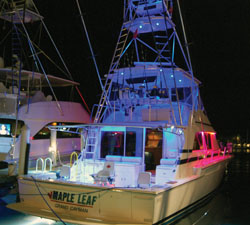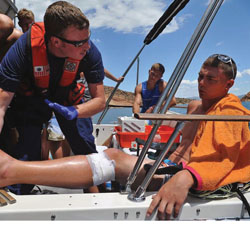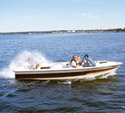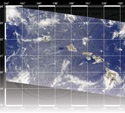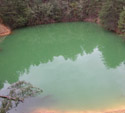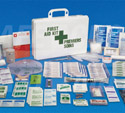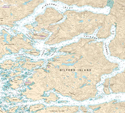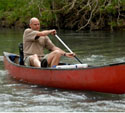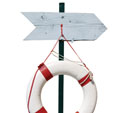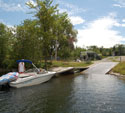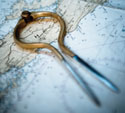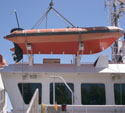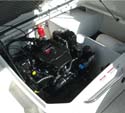October 18, 2011
Lighting the Way
So, who’s afraid of the dark? Well, some boaters should be. We were surprised to walk down the docks at one of Georgian Bay’s popular marinas and found that as many as one boat in five didn’t have a bow mounted spot. How often have you seen the weather settle down, the clouds part and the winds die down to give you an evening of beautiful, calm, sunset cruising conditions? Where I live, it’s pretty common.
August 23, 2011
First Aid and Hero Training
No one plans for an accident to happen while boating, but if it did, are you prepared? Is there a first aid kit on board? Is it easily accessible and fully stocked? Does anyone on board even know how to use it? Could you be the hero, or will you be just a bystander? Safety can be a hard sell. In Vancouver, Western Marine Company’s Alan Stovell said simply, “There is no requirement for first aid kits for recreational boaters.” He points out while commercial boaters must abide by strict regulations based on the crew and voyage there are no such restrictions for pleasure boaters in Canada, although it’s certainly recommended.
July 12, 2011
Travelling South of the Border
For those of you who boat south of the border, the following information bulletin was recently issued by U.S. Customs and Border Protection regarding a new program to permit easier entry of pleasure craft into the U.S. “The Small Vessel Reporting System (SVRS), a voluntary program offered by U.S. Customs and Border Protection (CBP), helps boaters report their arrival to the U.S. at no charge. The program is designed to expedite entry of legitimate boaters,
January 5, 2011
Insidious Carbon Monoxide
It’s difficult to comprehend that when we head out on the open water, with a fresh breeze, clear air and nary a boat nearby we could be a victim of something we usually associate with confined spaces and poor ventilation–Carbon Monoxide (CO). Onboard our vessels, we have a few potential sources of CO such as gasoline-powered engines and generators and propane cooking and heating appliances. Exhausts should dissipate harmful gases away from the boat, however experts in occupational health and safety, search and rescue and ambulatory care are identifying emerging issues for boaters.
December 30, 2010
The Aids To Navigation System
There’s nothing like that picturesque lighthouse flashing a light on a high cliff with pounding surf on the rocks below it. That large bell buoy clanging away in the swell just offshore from the breakers crashing on a shoal and the groaning foghorn blaring through the heavy mist to warn of landfall somewhere in the pea soup. Those certainly are the traditional icons we may all imagine when mention of aids to navigation is made but are they accurate in today’s technical world? And not withstanding today’s technology, how did and do the traditional aids actually help a mariner navigate safely?
December 23, 2010
“Water” Safety
Many of us unwittingly know a few words of Samuel Coleridge’s epic poetic story, The Rime of the Ancient Mariner. The words that are often quoted, though their source is seldom acknowledged, refer to being far away on the briny ocean tossed and go like this: water, water everywhere, ne any drop to drink.
December 17, 2010
Safety On Board
Transport Canada regulations require vessels to carry a variety of life saving equipment for use in emergencies. Make sure you know where this equipment is stored, and how to use it. For specific regulatory requirements, check the regulations that apply to your vessel. The Small Vessel Regulations set out the minimum safety equipment required on board a recreational boat according to vessel length.
November 4, 2010
The Art of (Paper) Charts
They decorate cottage walls, get lacquered into table tops, may have coffee stains, probably have water stains, are definitely creased, sometimes rolled and always informative. They are usually only printed with a few colours of ink, mostly one sided, regularly cover about 12 sq. ft. and are chock-a-block full of details for navigation and often inscribed with an ‘X’ that marks the spot.
June 2, 2010
Can You Canoe?
The canoe. Now that’s Canadian. They have been part of the landscape from since native North Americans plied the waterways to now being one of the most economical and accessible ways to get out on the water and explore. They seem simple enough – grab a paddle and go. Eagerly purchased, usually incompletely outfitted and almost never really understood or mastered. After a season or two, many a forgotten canoe can be found behind garage’s, under porches at cottages or at the boat ramp, gathering critter droppings and moss. But every once and a while a desire to get out on the water arises and someone remembers the Canadian icon, ignominiously hidden away. They haul it out, grab a paddle and go.
June 1, 2010
Make (Safe) Mistakes – Build Experience
The best thing that can result from an accident: we (hopefully) learn from our mistake. Perhaps even better is when someone else has the accident and we learn from his or her mistake! I have spent many years on the water and in as many different roles – like everyone, a recreational boater, like many, a sailing instructor and, like a few, in charge of a Search and Rescue unit.
May 21, 2010
OPG Warns Boaters About Low Water Levels
Ontario Power Generation (OPG) is reminding people that water levels on many lakes and rivers are much lower than normal for this time of year. “Most of the province had lower than normal snowfall, and April was one of the driest on record. This means that people going to their cottage or putting their boat in the water may see very low water levels,” said John Murphy, OPG’s Executive Vice President Hydro.
May 18, 2010
Get Lost
Most of us usually go boating on waters with which we are familiar, leaving the wharf of mooring where the boat is usually kept and heading off for the day, maybe even an overnighter. Sometimes we may plan a trip that takes us away from our home waters and venture into the unknown – the other side of the bay, up the coast or down the river to another lake. When we do, prudence means we have the right tools for navigation – at minimum: a compass and charts, perhaps a depth sounder, a GPS unit, maybe even a radar unit, probably not a sextant but hopefully a log book. It is with these tools and proper practices that prevent you from getting lost.
May 17, 2010
Don’t Panic!
Two simple words really. We’ve all heard ’em. Sound pretty d’urn simple – at least in practice. Of course, when things go south keeping a level head or a steady hand are easier said than done. And if worse comes to worst, panicking makes it even…worse, if that’s possible.
May 11, 2010
Your Turn on the Wheel
No lines, no intersections, no stoplights, no gridlock. The water – the place to get away from it all. There is enough of it in Canada that it really is hard to find a congested waterway. Sure, they exist and if you chose to go where everyone else thinks is the place to go on that day, then you’ll find it. But there are so many choices of destinations and so many ways to get there that if you plan well, you can surely feel like you are alone in the middle of nowhere and let your troubles, your worries and your responsibilities slip away. Hold on – not all of your responsibilities. As captain of the vessel, you are legally responsible for the operation of the craft and the safety of the crew and passengers on board.
April 29, 2010
The Little Red Boat That Could – And Does!
There are many types of boats – the sleek racing ones, the comfortable cottage-on-the-water ones and the purely functional ones. Ours recently got a rich red paint job, some TLC and a new 15 hp 4-stroke. . It’s not that pretty but in function not much can compete with it. It spends winters under a roof and out of the snow. It gets family and friends out to an isolated island in the North Channel of Lake Huron. I call it our container ship – although really an oversized rowboat – considering the loads it takes out to this isolated haven and the speed at which it travels. Its 16-feet long, steel, tough, heavy, flat-bottomed, stable and fondly known as a “Tilbury”.
November 14, 2009
Eye Protection for Boaters
It happens every year. The minute the thermometer reaches over 10 or 12 degrees you see them. Canadians emerge from winter hibernation. Yes! Finally the warm sun is back again! Venturing out, we usually think of the sunscreen with the best SPF money can buy, and perhaps a hat … as long as it doesn’t cramp our style, and sunglasses … again something stylish. But little thought goes into why these are necessary.
November 14, 2009
Fire Systems
Engine room fires are mercifully rare, but every so often, one does occur. The engine room is the most likely place on your boat for a fire to get started and if the fire breaks out while you are out on the water, the lives of everyone on board are at risk.

